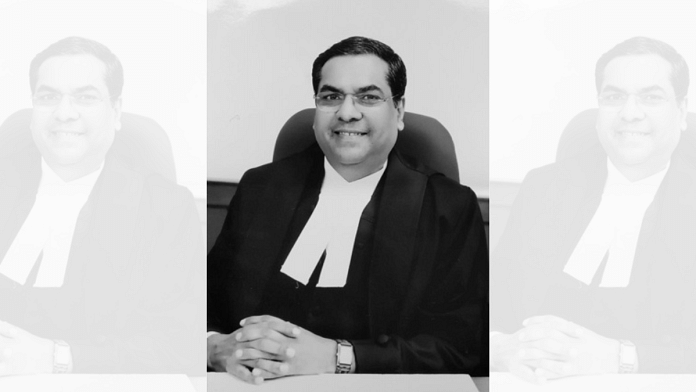New Delhi: “Obfuscation” of donor’s details as provided in the Electoral Bond Scheme (EBS) may have “led to unaccounted and laundered money getting legitimised”, opined Justice Sanjiv Khanna Thursday, a day after a five-judge Supreme Court bench struck down the scheme that allowed big-ticket anonymous corporate contributions to political parties.
Justice Khanna was among the five judges who repealed the EBS as unconstitutional and also invalidated amendments made to four laws to facilitate it. However, he wrote his own concurring opinion, supporting the one written by Chief Justice of India D.Y. Chandrachud on behalf of justices B.R. Gavai, J.B. Pardiwala and Manoj Mishra and himself.
While introducing the Finance Act of 2017, which amended certain laws to introduce EBS, the then finance minister had said the main purpose of the scheme was to curb the flow of black money in electoral finance.
However, the judge doubted whether EBS indeed curbed black money. He even questioned the Centre for claiming that the legitimate aim of the scheme was to protect donors from retribution, victimisation or retaliation, observing how an “unlawful” act be cited as an objective for introducing EBS.
“I am of the opinion that retribution, victimisation or retaliation cannot by any stretch be treated as a legitimate aim. This will not satisfy the legitimate purpose of prong of the proportionality test,” the judge said.
According to Justice Khanna, curtailing black or unaccounted for money in the electoral process has no connection or relationship with concealment of identity of the donor. A donor can always protect their identity through using banking channels, which the judge described as an “existing antidote” to black money.
Giving his own reasons for striking down EBS as unconstitutional, Justice Khanna said the scheme introduced through a raft of amendments in multiple laws failed the four-prong test under the doctrine of proportionality, as there was no legitimate purpose behind it. Besides, there was no reasonable nexus between means and the object the scheme sought to achieve, he added.
He referred to the Reserve Bank of India’s (RBI) objection to EBS, which said the bonds could change hands after they had been issued. Since the actual purchaser’s identity is completely concealed, the scheme may enable the original contributor or donor to not leave any traceability or money trail, the RBI said.
Highlighting RBI’s response to the scheme, the judge observed: “Money laundering can be undertaken in diverse ways. Political contributions for a quid pro quo may amount to money laundering, as defined under the Prevention of Money Laundering Act, 2002.”
Therefore, he held that while secret ballots are integral to “fostering free and fair elections, transparency and not secrecy in funding of political parties is a prerequisite for free and fair elections”. This also secured the rights of individuals in a democratic set-up by ensuring “each a share in political power”.
But this right gets affected when a few make large political donations to “secure selective access to those in power,” the judge added.
He even dismissed Centre’s explanation on EBS protecting donors from being victimised by political parties to whom they don’t contribute.
“Retribution, victimisation or retaliation against any donor exercising their choice to donate to a political party is an abuse of law and power,” he said, adding, something illegal cannot be justified as an objective behind a scheme or legislation.
“As it is a wrong, the wrong itself cannot be a justification or a purpose. The argument, therefore, suffers on the grounds of inconsistency and coherence as it seeks to perpetuate and accept the wrong rather than deal with the malady and correct it,” said Justice Khanna.
In his view, fear of retaliation, victimisation and reprisal would exist as the identity of the purchase of the bond can always be revealed upon registration of a criminal case or by a court order. Therefore, he said, the “so-called protection exists only on paper but in practical terms it is not a good safeguard”.
Commenting on a ruling political party’s power to access information, the judge noted they also retained the ability to use their power of investigation to “compel the revelation of Bond-related information”.
He went on to further hold that neither the scheme nor the amendments to various laws “rationally connect to the fulfilment of the purpose (behind EBS)”.
The judge also agreed with CJI Chandrachud’s decision to reject the Centre’s stand that EBS was beyond judicial review as it was a matter of economic policy. The EBS, he held, was introduced as part of electoral reform as contributions to political parties relate to democratic polity, and the citizens’ right to know and accountability.
“To give the legislation the latitude of economic policy, we will be diluting the principle of free and fair elections. Clearly, the importance of the issue and the nexus between money and electoral democracy requires us to undertake an in-depth review, albeit under the settled powers of judicial review,” he said.
From the data that was presented to the court during the hearing showed there “has been a substantial increase in contribution/donation through bonds,” Justice Khanna pointed out. And, a majority of the contribution, he noticed, went to ruling parties in the Centre and the states.
(Edited by Tikli Basu)
Also read: 10 important observations SC made while striking down electoral bonds scheme as unconstitutional



